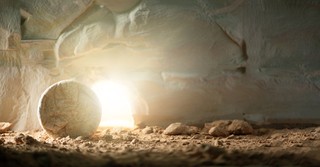Why Is 'The Stone Was Rolled Away' so Essential to Christianity?
Share

The stone was rolled away is a popular phrase and song lyric among Christians. Where do the words come from? Why are they so important? Let’s take a closer look at this phrase in context.
What Does 'The Stone Was Rolled Away' Mean?
Jesus’s crucifixion took place before a special Sabbath day. The Jewish leaders didn’t want bodies hanging on crosses for the occasion so they made a request. They asked Pilate to have the legs of the convicted men broken to speed up their impending deaths. First, soldiers went to the other two criminals to carry out the task. When they approached Jesus, however, they noticed he was already dead.
Later, a disciple of Jesus, Joseph of Arimathea asked Pilate for Jesus’s body. Joseph had his own unused tomb he wanted to give Jesus. The gravesite was carved out of a rock. After Pilate permitted Joseph to take the body, he wrapped him in clean linen and placed him in the tomb.
Matthew Henry explains “ Providence ordered it that Christ’s sepulcher should be in a solid entire rock, that no room might be left to suspect his disciples had access to it by some underground passage, or broke through the back wall of it, to steal the body; for there was no access to it but by the door, which was watched.”
Then Joseph rolled a huge stone in front of the grave and went away. Women who had come with Jesus from Galilee stood by witnessing the burial. Jesus’s body was secluded from the world, cut off from the living. There was no way in and a guard was placed outside to keep watch,
Luke 24:1-6: “On the first day of the week, very early in the morning, the women took the spices they had prepared and went to the tomb. They found the stone rolled away from the tomb, but when they entered, they did not find the body of the Lord Jesus. While they were wondering about this, suddenly two men in clothes that gleamed like lightning stood beside them. In their fright the women bowed down with their faces to the ground, but the men said to them, “Why do you look for the living among the dead? He is not here; he has risen!”
Jesus wasn’t lying in the tomb anymore. He had risen from the dead. An angel of the Lord rolled the stone away to share the good news.
Matthew 28:2-4: “There was a violent earthquake, for an angel of the Lord came down from heaven and, going to the tomb, rolled back the stone and sat on it. His appearance was like lightning, and his clothes were white as snow. The guards were so afraid of him that they shook and became like dead men.”
Jesus could have rolled the stone away himself, but he chose not to. Matthew Henry explains that Jesus rolling the stone away would mirror a prisoner breaking out of jail. He didn’t want anyone to think he was breaking the law or taking undesirable action. The angel signifies an officer opening the tomb for Jesus, freely and justly. Henry goes on to explain that the stone represents our sins and when it was rolled away, it represents our sins being overtaken by Jesus’s resurrection.
Get your FREE 8-Day Prayer and Scripture Guide - Praying Through the Holy Week HERE. Print your own copy for a beautiful daily devotional leading up to Easter.
What Do We Know about the Stone and Guards in Front of Jesus' Tomb?
The Zondervan Handbook of Biblical Archaeology explains stones used to close graves weighed tons. They could not be moved by a single person. This is confirmed in a conversation by three women on the third day after Jesus’s death. They ask who will move the stone. They realize that even together they are unable to roll the stone away.
We also can’t assume Joseph rolled the stone by himself. John 19:39 tells us Nicodemus helped with the essential tasks. Together, they wrapped Jesus’s body and laid him in the tomb. It can be assumed that Joseph oversaw the burial rituals and did not act alone, including rolling the stone in front of the grave.
Since Jesus’s gravesite was cut out of a rock, the stone ensured complete enclosure of the tomb. Stealing Jesus would be impossible without opening the entrance. Matthew 27:66 says, “So they went and made the tomb secure by putting a seal on the stone and posting the guard.” The chief priests and Pharisees were nervous one of Jesus’s disciples would steal his body since Jesus promised he would rise from the dead on the third day. They didn’t want to take any chances of a fake resurrection.
Where Do Stones Show Up Elsewhere in Scripture?
1 Samuel 14:33: “Then someone said to Saul, “Look, the men are sinning against the Lord by eating meat that has blood in it.” “You have broken faith,” he said. “Roll a large stone over here at once.”
In this passage, the stone represents the guilt of sin. Jesus overcame sin and the stone with the resurrection. We are all imperfect and unable to remain completely faithful to God. Sin causes guilt and shame. The heaviness of these emotions can make us feel trapped. Jesus overcame this entrapment and allows his followers to walk in freedom with him.
Before his death, Jesus went to Galilee. While he was teaching, teachers of the law and the Pharisees brought a woman convicted of adultery to the temple courts. The law issued that she be stoned. Jesus challenged any spectators without sin to throw the first stone. No one, however, threw a rock at the woman. They realized they too had sinned. In the end, Jesus is left alone with the woman…and her iniquities. He overcame the required stoning of those with transgressions. When we are in community with Jesus our stones, or sins, are left on the ground and no one has the power to hurl condemnation at us.
Why Is it Important to Christianity that the Stone Was Rolled Away?
When the stone was rolled away, Jesus proved he was who he said he was, the Son of God. The emptied grave showed the world he had risen from the dead and completed his mission of coming to earth to save the world from their sins. Instead of lying lifeless in a grave, he is now alive, sitting at the right hand of the father.
The woman didn’t see the risen Jesus, they saw the empty grave. The angel told them to remember what Jesus had said about rising from the dead. Like the woman who had to remember Jesus’s promise, we too can take Jesus for his word. When we believe Jesus is the Son of God, we are made right with him and ensured salvation.
Without a rolled-away stone, Christians wouldn’t have much to celebrate at Easter. When the stone was rolled away, it showed that Christ had overcome death on the cross and the sins of all his people. The stone couldn’t stop Jesus. Guards couldn’t stop Jesus. Death couldn’t stop Jesus. Jesus is alive today, and like the angel who sat on the stone, he is sitting at the right hand of the father offering his good news to all who will accept his gift.
Photo credit: ©Getty Images/jchizhe

Jenna Brooke Carlson is an elementary dual language teacher in the Chicago suburbs. As a member of American Christian Fiction Writers and Word Weavers, she enjoys spending time with other writers and perfecting her craft. Her debut novel, Falling Flat, spreads the message that healing can occur, even after tragedy. Along with writing, she’s pursuing her dreams of creating a community of brave young women, who she can encourage to live out their dreams amid challenges and imperfection. Her days are busy, but she’s determined she can conquer anything with a fuzzy blanket and a hot cup of tea. To find out more about Jenna, visit her website at jennabrookecarlson.com.